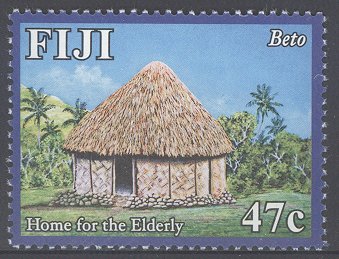Stamp: Navala Village Tourist Site (Fiji 2016)
Navala Village Tourist Site (Fiji 2016)
27 July (Fiji ) within release Navala Village Tourist Site goes into circulation Stamp Navala Village Tourist Site face value 47 Fijian cent
| Stamp Navala Village Tourist Site in catalogues | |
|---|---|
| Colnect codes: | Col: FJ 2016-03B |
Stamp is square format.
Also in the issue Navala Village Tourist Site:
- Stamp - Navala Village Tourist Site face value 47;
- Stamp - Navala Village Tourist Site face value 10;
- Stamp - Navala Village Tourist Site face value 38;
- Stamp - Navala Village Tourist Site face value 85;
|
Data entry completed
46%
|
|
|---|---|
| Stamp Navala Village Tourist Site in digits | |
| Country: | Fiji |
| Date: | 2016-07-27 |
| Emission: | Commemorative |
| Format: | Stamp |
| Face Value: | 47 Fijian cent |
Stamp Navala Village Tourist Site it reflects the thematic directions:
A building or edifice is a structure with a roof and walls standing more or less permanently in one place, such as a house or factory. Buildings come in a variety of sizes, shapes and functions, and have been adapted throughout history for a wide number of factors, from building materials available, to weather conditions, to land prices, ground conditions, specific uses and aesthetic reasons. Buildings serve several needs of society – primarily as shelter from weather, security, living space, privacy, to store belongings, and to comfortably live and work. A building as a shelter represents a physical division of the human habitat (a place of comfort and safety) and the outside (a place that at times may be harsh and harmful).
A house is a single-unit residential building. It may range in complexity from a rudimentary hut to a complex structure of wood, masonry, concrete or other material, outfitted with plumbing, electrical, and heating, ventilation, and air conditioning systems. Houses use a range of different roofing systems to keep precipitation such as rain from getting into the dwelling space. Houses generally have doors or locks to secure the dwelling space and protect its inhabitants and contents from burglars or other trespassers. Most conventional modern houses in Western cultures will contain one or more bedrooms and bathrooms, a kitchen or cooking area, and a living room. A house may have a separate dining room, or the eating area may be integrated into the kitchen or another room. Some large houses in North America have a recreation room. In traditional agriculture-oriented societies, domestic animals such as chickens or larger livestock (like cattle) may share part of the house with humans.
Tourism is travel for pleasure or business; also the theory and practice of touring, the business of attracting, accommodating, and entertaining tourists, and the business of operating tours. Tourism may be international, or within the traveller's country. The World Tourism Organization defines tourism more generally, in terms which go "beyond the common perception of tourism as being limited to holiday activity only", as people "traveling to and staying in places outside their usual environment for not more than one consecutive year for leisure, business and other purposes". Tourism can be domestic or international, and international tourism has both incoming and outgoing implications on a country's balance of payments. Today, tourism is a major source of income for many countries, and affects the economy of both the source and host countries, in some cases being of vital importance.



